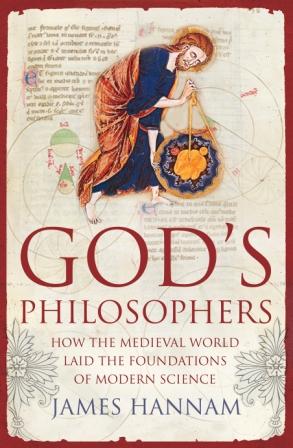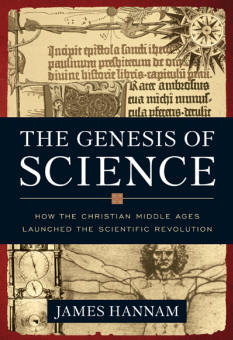
|
If you have enjoyed Bede's Library, you can order my book, The Genesis of Science: How the Christian Middle Ages Launched the Scientific Revolution (US) from Amazon.com or God's Philosophers: How the Medieval World Laid the Foundations of Modern Science (UK) from Amazon.co.uk. |
|
For my latest thoughts on science, politics, religion and history, read Quodlibeta
|
![]()
![]()
![]()
![]()
History of Science books
![]()
Back to the Index of Book Reviews
Even more than Christian apologetics, I am fascinated by the history of science and why so little is known about it by the general public. The books reviewed below will help with thinking outside the box on this subject and dismiss many of the myths that have accrued since the late nineteenth century. My specialities are medieval science and the relationship between science and Christianity - both of these topics are well represented here.
Soul of Science
Savior of Science
The Beginnings of Western Science
Foundations of Modern Science in the Middle Ages
The Scientific Revolution
The Structure of Scientific Revolutions
For the Glory of God
![]()
The
Soul of Science
Nancy Pearcey and Charles Thaxton
One of my favourite debates on the discussion boards of the internet is the influence of Christianity on the rise of modern science. Atheists have a lot of trouble accepting that it was the Christian worldview, coupled with Greek thought, that caused the great revolution in natural philosophy in the seventeenth century. This excellent book is a history of science from that period up until the present day and shows how Christianity and other philosophies have informed the work of scientists. The aim is to show that science and faith are allies and not enemies. Instead, it is when philosophers try to build metaphysical systems on top of scientific ideas that conflicts arise.
For instance, the mechanical universe of the eighteenth century rationalists was based loosely on the ideas of Newton. But Newton himself was a Christian who clearly saw God at work in the cosmos. The trouble with basing your philosophy on science is that science changes and it can leave your philosophy behind. This has been the fate of many atheist thinkers and today no one is a mechanist.
Both the physical sciences and biology are covered and there is an entire section on the rise and partial fall of mathematics. I found the chapter on the belated biological revolution particularly fascinating since I knew little about it previously. This is a book for Christians and attacks its subject from within the Christian worldview. Atheists will simply not accept this point of view although they may find it makes an interesting read. As a Christian with a physics degree I thoroughly enjoyed this book because it deals with the many different trends of thought in science through the centuries in a way that I had never really considered before.
Back to contents
![]()
Savior
of Science
Stanley Jaki
Stanley Jaki has more qualifications to his name than any man should need. He has doctorates in theology and physics, is a Benedictine monk and recipient of the Templeton Prize. His interests are manifold but the thesis with which is name is most often associated is how scholasticism led to the rise of modern science.
His position is actually much more extreme than that to the extent that even I, a Catholic, find it wholly unacceptable. He blames the failure of other cultures to achieve much scientific advancement on nothing other than original sin. His analysis of how this manifests itself is useful and interesting but he should rather have based his study of the reasons for the failure of science outside the West on cultural and anthropological causes. So this book is high level apologetics and theology rather than history of science.
That said it contains many interesting details and facts, some of which other texts would not choose to emphasise. Jaki has no truck with creationists who he labels as naive and his waspishness is amusing at times. But I fear his central thesis will be palatable only to his fellow Catholic theologians.
Back to contents
![]()
The
Beginnings of Western Science
David Lindberg
The degree of ignorance about the history of science is truly staggering and prior to starting my research on the subject I was certainly guilty of it. This is a function of the triumphant way that science presents itself through popular works like Carl Sagan's Cosmos (which contains more myths than the book of Genesis) and even science textbooks that present everything as settled and completely without historical context. For me, reading this book, the standard textbook on Western Science before sixteenth century, was nothing less than a revelation. There was so much happening, done by so many people most of whom I had not even heard off.
Starting with the pre-Socratics, Lindberg then gives a detailed account of Aristotle's natural philosophy. He is always keen to explain the ideas of ancient thinkers within the context of their own thought instead of simply judging them by how well they anticipate modern concepts. This is very important because only by seeing the world as earlier generations saw it can we hope to understand what they were trying to achieve with their science and how successful they were.
Realising many of his readers will not know much about the subject at all, Lindberg makes a point of dispelling myths such as the ancients believing the earth was flat or early Christians suppressing pagan learning. He then shows how at least some science survived through the dark ages in the West so that its thinkers were keen to find other sources of knowledge once they became available. The second half of the book is about scholasticism and the rise of Aristotle in the Middle Ages. Here some of the names are familiar but others were completely new to me. The rise of the university and the condemnations of 1277 are covered with the level of detail appropriate for an introductory text. All in all this is the first book that anyone interested in medieval science should pick up and ought to be required reading for any history of science course.
Back to contents
![]()
The
Foundations of Modern Science in the Middle Ages
Edward Grant
Edward Grant is one of the world's most experienced and respected scholars on medieval science. His Physical Sciences in the Middle Ages, published in 1971, was the standard work for many years but when , on retirement, he found he had time to revised it, he realised he had changed his mind.
The 1971 book is a survey of medieval science without much thought given to what happened afterwards. Grant believed that the arguments over vacuums and violent motion that had so vexed the scholastics were swept away by the Scientific Revolution. In Foundations of Modern Science he does not ask which lines of research in the fourteenth century may have contributed to the work of Galileo (who scholars now realise owed them a lot more to his predecessors than he liked to admit). Instead, Grant asks what it was about the intellectual environment of the Middle Ages that made it such fertile ground for modern science to take root in. Among other things he suggests the foundation of universities and the tolerance of Christian theologians towards natural philosophy.
Unfortunately, the book is in need of a savage editor as Grant repeats himself over and over but coupled with Lindberg this should give an excellent idea of the state of play in the study of Medieval Science.
Back to contents
![]()
The
Scientific Revolution
Steven Shapin
Steven Shapin begins his rather idiosyncratic book with the words "The scientific revolution never happened and this is a book about it". What follows does not quite live up to this billing but Shapin can hardly be blamed for wanting to use such an excellent line.
What the book convincingly demonstrates is that the new philosophy introduced in the seventeenth century was by no means a homogenous enterprise. There were many arguments and disagreements about the best ways forward, with the theorists like Descartes still trapped in the old ways of thinking (involving making something up that sounded good and passing it off as science. Freud, of course, could do the same thing centuries later with even more success). On the other side, experimentalists like Boyle insisted on interacting with the real world but could not agree on how to go about it - controlled experiments or unhindered observation? Shapin reports these arguments in a completely non-judgemental fashion that helps us see that our own assumptions about science were by no means universally held.
However, the author shows no interest in tracing the paths back from the seventeenth century to the Middle Ages to find the origins of the scientific revolution. If he wanted to demonstrate its unrevolutionary nature he should, perhaps, have shown how it was an extension of certain ideas that had been passed around for centuries. In all, though, this is an interesting book about the divergent opinions of the seventeenth century that have now been subsumed under the myth of one true scientific method.
Back to contents
![]()
The
Structure of Scientific Revolutions
Thomas Kuhn
This is almost certainly the most famous book about the history of science and definitely the most controversial. Its influence has been felt well beyond the narrow confines of the discipline and it is referred to by many more people than have actually read it. For relativists, Kuhn's theories have been a big stick with which to beat science's claims of objectivity. More seriously for pseudo-scientists, Kuhn has allowed every hare brained crank to declare a paradigm shift to their own ideas is imminent. As for the scientists themselves, they have largely ignored Kuhn and their methods practice and self belief has not been effected by his theories at all. Most working scientists have probably not even heard of him.
There are many summaries of the book on the web. There are also numerous reviews and critiques to look at and the book itself, if you want to be one of the ones who has actually read it, is only about 180 pages of admittedly rather flat prose. My brief thoughts on Kuhn's work will assume some familiarity with what he has to say.
The most important question should be, is he right? Well, of course he isn't. His idea that scientific development always follows the structure of normal science, crisis and then revolution is simply not true as any serious study of the history will show. In fact, any theory that tries to reduce human behaviour to neat patterns is doomed to failure. But in a deeper sense his book performed a valuable service because never again will any study assume that scientific development can some how be divorced from either culture or human action.
Kuhn's book will probably end up being used a bit like AJ Ayer's Language, Truth and Logic which undergraduates are set in order to learn how to refute a fallacious argument. But like Ayer, Kuhn will be adjudged far more important for how he influenced others than anything he did himself.
Back to contents
![]()

